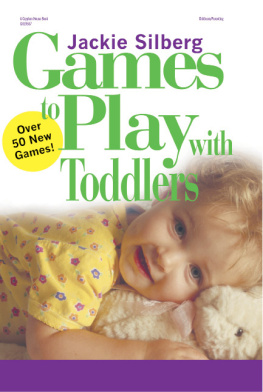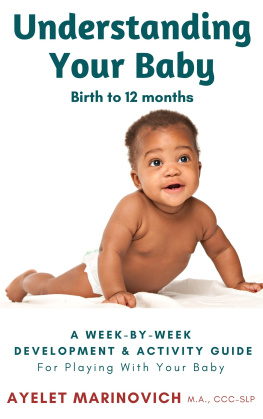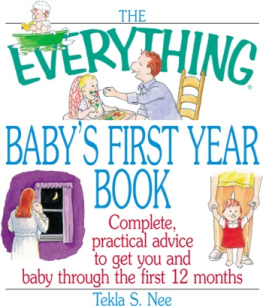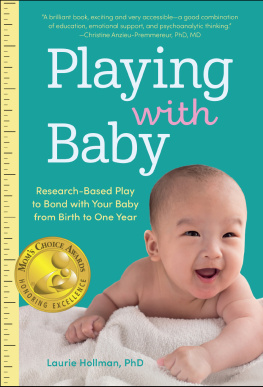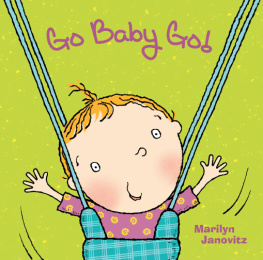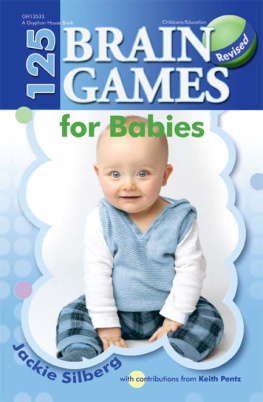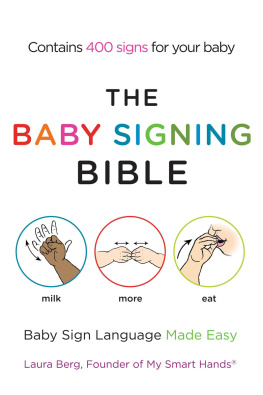Acknowledgments
Many thanks to*Anne Meeker Miller, who contributed the signing games in this book
*My wonderful editor, Kathy Charner, whom I have worked with for many years
*Larry Rood and Leah Curry-Rood, who have supported my work and given me much encouragement
Other books by Jackie Silberg:
125 Brain Games for Babies: Simple Games to Promote Early Brain Development
125 Brain Games for Toddlers and Twos: Simple Games to Promote Early Brain Development
Brain Games for Babies, Toddlers, and Twos: 140 Fun Ways to Boost Development
Games to Play with Babies, Third Edition
Games to Play with Toddlers, Revised
Games to Play with Two-Year-Olds, Revised
Go Anywhere Games for Babies
REFERENCES AND RESOURCES
Books
Acredolo, L., & Goodwyn, S. (2000). Baby minds: Brain-building games your baby will love. New York: Bantam Books.
Barnet, A., & Barnet, R. (1998). The youngest minds: Parenting and genes in the development of intellect and emotion. New York: Simon and Schuster.
Bergen, D., Reid, R., & Torelli, L. (2001). Educating and caring for very young children: The infant/toddler curriculum. New York: Teachers College Press.
Berk, L. (2000). Child development (5th ed.). Needham Heights, MA: Allyn & Bacon.
Charner, K., Murphy, M., & Clark C. (Eds.). (2006). The encyclopedia of infant and toddler activities. Beltsville, MD: Gryphon House.
Crowe, R., & Connell, G. (2004). Moving to learn. Christchurch, New Zealand: Caxton Press.
Hirsh-Pasek, K., & Golinkoff, R. M. (2003). Einstein never used flash cards: How our children really learnand why they need to play more and memorize less. New York: Rodale.
Hoff-Ginsberg, E. (1997). Language development. Pacific Grove, CA: Brooks/Cole.
Oberlander, J. (2007). Fun start. London: Harper Thorson.
Oesterreich, L. (1995). Ages & stages: Newborn to 1 year. In L. Oesterreich, B. Holt, & S. Karas, S. Iowa family child care handbook. Ames, IA: Iowa State University Extension.
Silberg, J. (1999). 125 brain games for babies. Beltsville, MD: Gryphon House.
Silberg, J. (2001). Games to play with babies (3rd ed.). Beltsville, MD: Gryphon House.
Articles
Arnold, R., & Colburn, N. (2005). Oh! What a smart babyWhat you need to know about childrens brain development. School Library Journal, 51 (2), 37.
Brannon, E. M. (2002, April). The development of ordinal numerical knowledge in infancy. Cognition, 83, 223-240.
DeNoon, D. J. (2007, August 7).Smart baby DVDs no help, may harm. WebMD Medical News. Available online at children.webmd.com/news/ 20070807/smart-baby-dvds-no-help-may-harm.
Gopnik, A. (1996). The Post-Piaget era. Psychological Science. 7 (4), 221-225.
Kuhl, P. K., & Meltzoff, A. N. (1996). Infant vocalizations in response to speech:Vocal imitation and developmental change. Journal of the Acoustical Society of America, 100(4), 2425-2438.
McGaha, C. (2003). The importance of the senses for infants. Focus on Infants and Toddlers 16 (1).
Nitschke, J. B., Nelson, E. E., Rusch, B. D., Fox, A. S., Oakes, T. R., & Davidson, R. J. (2004, February) Orbitofrontal cortex tracks positive mood in mothers viewing pictures of their newborn infants. Neuroimage, 21(2), 583-592.
Park, A. (2007, August 6). Baby Einsteins: Not so smart after all. Time.
Phillips-Silver, J., & Trainor, L. J. (2005, June). Feeling the beat: Movement influences infant rhythm perception. Science, 308(5727), 1430.
Websites
aplaceofourown.net/question_detail.php?id=355information about infant brain development
babyzone.com/baby/a1849enjoying your baby from day 1 to year 1
bananasinc.org/uploads/1126298158.pdfdevelopmental milestones for 0-12 months
brilliantbaby.comactivities to create a happier and smarter child
drgreene.comanswers to common pregnancy and parenting questions.
ed.gov/parents/earlychild/ready/healthystart/fourmonth.pdfmonth by month developmental activities for babies 0-12 months
fisher-price.cominformation on infant growth
littlekidsgamesonline.com/newborn-babies.htmlgames for newborns
nccic.org/pubs/goodstart/state-infant-elg.htmlchild care guidelines for all states
ncsmartstart.org/index.htmThe North Carolina partnership for children
parents.com/parentslots of information about babies
pbs.org/parents/earlylearning/parentese.htmlinformation about raising babies and preschoolers
preksmarties.comarticles about teaching babies, infant intelligence and infant stimulation
reading.orgInternational Reading Association
smartbaby.com
whitehouse.gov/firstlady/ed_8month_text.pdffiles similar to this also available for ages from birth to 12 months
zerotothree.orgeverything you want to know about infants
PowerPoint Presentation
Word segmentation: Effects of the native language and of the native dialect by Thierry Nazzi, Laboratoire Psychologie de la Perception, CNRS, Universit Paris.
CHAPTER 1
FOR BABIES FROM BIRTH TO 3 MONTHS OLD
Developmental Chart for Babies from Birth to 3 Months Old
Physical Development
Babies who are up to 3 months old may
* Hold a rattle
*Lift their head and chest when lying on their stomach
*Follow moving objects with their eyes
*Stretch their limbs all the way out
*Want visual stimulation
*See things about 10 inches away
Social-Emotional Development
Babies who are up to 3 months old may
*Begin to respond to familiar voices
*Stare at objects or faces of people
*React to and be comforted by many kinds of sounds
*Smile at faces
*Like when people or objects touch their skin
Intellectual Development
Babies who are up to 3 months old may
*Discover their hands and feet
*Enjoy feeling different textures
*Recognize familiar faces and scents
*Be aware of their left and right sides
*Begin to connect sounds with their sources
*Distinguish different voices, qualities, and tone
Games and Experiences to Develop Babies Physical Skills
Gentle Sounds
Developmental milestone: Babies who are up to 3 months old may hold a rattle.
*Find toys that make gentle sounds when you move them.
*Move close to your baby and shake or move the toy so it makes a soft sound.
*The sound will draw your babys attention to the toy and he may reach out his hands to hold the object.
*If you place the toy in his hand he may grasp it.
On the Ball
Developmental milestone: Babies who are up to 3 months old may lift their head and chest when lying on their stomach.
*Sit in front of a large inflatable ball.
*Hold your baby securely as you place him on the ball, facing you with his tummy on the ball so he can lift his head and chest.
*While you continue to hold him securely, gently roll the ball back and forth a short distance.
*Add to this experience by making funny sounds.
*The motion of the ball is relaxing for your baby and he will enjoy watching your face as you make funny sounds.


